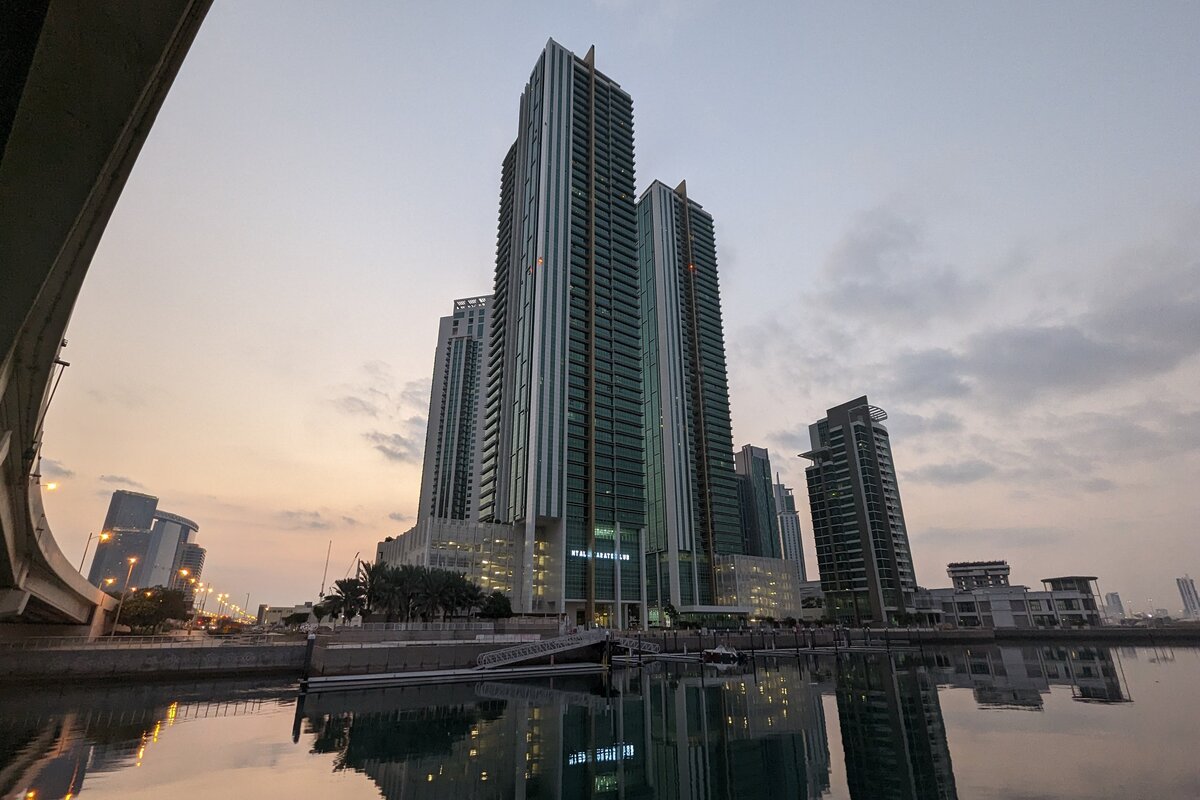
Creating a Retirement Plan for Expatriates Living in Abu Dhabi – Trust Accounts Management

The United Arab Emirates (UAE), and particularly Abu Dhabi, has become a popular destination for expatriates seeking career opportunities and a high standard of living. As a result, many expatriates find themselves establishing long-term residence in the UAE. Planning for retirement as an expatriate in Abu Dhabi requires careful consideration of various financial, legal, and cultural aspects.
This article will guide expatriates through the process of creating a retirement plan tailored to their unique circumstances in this vibrant and diverse city. People from all over the world want to spend their golden years in luxurious cities like New York, London, or Abu Dhabi in the Middle East.
Retirement In Abu Dhabi.
Before diving into the specifics of creating a retirement plan, it’s crucial for expatriates to understand the context of Abu Dhabi. Abu Dhabi is one of the seven emirates that make up the UAE and serves as the capital city.
As a global business hub, Abu Dhabi offers a unique environment for expatriates, but it also has distinct cultural and legal nuances that can impact retirement planning. Abu Dhabi is not like Western cities like New York or London so
- Visa and Residency

Expatriates in Abu Dhabi typically require a residence visa to live and work in the UAE. Understanding the visa regulations, renewal processes, and potential implications for retirement is essential.
Expatriates nearing retirement age may face changes in visa eligibility, requiring them to consider alternative residency options.
- Cultural Considerations
The UAE is known for its rich cultural heritage. Understanding local customs, traditions, and social expectations can help expatriates navigate their retirement years with respect and ease. It’s also crucial to consider how these cultural factors might affect your retirement lifestyle choices.
- Legal Framework
The legal framework in Abu Dhabi, including matters related to property ownership, inheritance, and taxation, is unique and different from many Western countries. It is important to consult with legal experts who specialize in UAE law to ensure your retirement plans align with local regulations.
Financial Planning for Retirement.

Preparing for retirement is a pivotal milestone in every individual’s financial journey. It’s a time to reap the rewards of years of hard work and careful financial planning. Crafting a solid retirement plan ensures that you can enjoy your golden years with financial security and peace of mind. Whether you’re just starting out or fine-tuning an existing plan, this comprehensive guide will equip you with the knowledge and tools needed to navigate the path to a fulfilling and financially secure retirement.
- Assessing Financial Goals
The first step in creating a retirement plan for expatriates in Abu Dhabi is to assess your financial goals. These goals can include factors such as the desired retirement age, the standard of living you want to maintain, and any specific financial objectives like travel or purchasing property.
- Investment and Savings
Expatriates should consider a mix of investment and savings options to build a secure retirement nest egg. Common choices include employer-provided pension schemes, personal savings accounts, and offshore investments. Diversification is key to managing risk and optimizing returns.
- Currency Considerations
Abu Dhabi’s currency is the UAE Dirham (AED), which is pegged to the United States Dollar (USD). Currency fluctuations can impact the purchasing power of retirees, so it’s important to consider the currency in which you save and invest, as well as the currency in which you plan to spend during retirement.
When planning for retirement as an expatriate in Abu Dhabi, it’s crucial to pay close attention to currency considerations. Currency fluctuations can have a significant impact on the value of your retirement savings. Here are some key points to keep in mind:
- Understanding Currency Dynamics: The value of currencies can fluctuate due to various factors including economic conditions, geopolitical events, and central bank policies. It’s important to stay informed about these factors and how they may affect the exchange rate between your home currency and the UAE Dirham (AED).
- Impact on Purchasing Power: Fluctuations in exchange rates can directly influence your purchasing power. A stronger home currency relative to the AED may increase your purchasing power, allowing you to afford more goods and services. Conversely, a weaker home currency may reduce your purchasing power.
- Diversification of Currency Holdings: Consider diversifying your currency holdings to mitigate the impact of currency fluctuations. Holding a mix of currencies or considering investments denominated in different currencies can help spread risk.
- Currency of Retirement Expenses: Think about the currency in which you plan to spend the majority of your retirement. If you anticipate significant expenses in your home country, it may be prudent to keep a portion of your savings in your home currency.
- Foreign Exchange Services: When converting currencies, be mindful of exchange rates and any associated fees. It’s advisable to use reputable foreign exchange services or financial institutions to ensure you get the best rates possible.
- Long-Term Currency Trends: While short-term fluctuations are common, consider the long-term trends of the currencies involved. Historical data and economic forecasts can provide insights into potential future movements.
- Consulting a Financial Advisor: Given the complexity of currency considerations, consulting a financial advisor with expertise in expatriate financial planning and currency risk management can be invaluable. They can provide tailored advice based on your specific situation.
By staying informed and taking proactive steps to manage currency risk, you can help safeguard the purchasing power of your retirement savings, ensuring a more secure and comfortable retirement in Abu Dhabi.
- Tax Planning
Understanding the tax implications of your financial decisions is crucial. The UAE is known for its tax-friendly environment, with no personal income tax and minimal capital gains tax. However, expatriates should still be aware of international tax treaties and obligations in their home countries.
Retirement Savings and Investment Vehicles.

Embarking on a fulfilling retirement journey as an expatriate in Abu Dhabi demands careful planning and a deep understanding of the local landscape. To ensure financial security, legal adherence, and a rewarding lifestyle, consider these essential guidelines. Don’t hesitate to seek professional advice from Trust Accounts Management for personalized retirement solutions. Secure your future in Abu Dhabi with confidence and tranquility.
FAQ
- UAE Retirement Savings Schemes
The UAE offers retirement savings schemes, such as the Employee Provident Fund (EPF) and the End of Service Gratuity (ESG), to expatriates. These schemes are often mandatory for employers to contribute to and can provide a significant portion of retirement income.
- Personal Savings and Investment Accounts
Expatriates should also consider establishing personal savings and investment accounts. Options include bank savings accounts, fixed deposits, mutual funds, and real estate investments. Offshore accounts may be beneficial for tax planning and asset protection.
- Real Estate Investment
Investing in property is a popular choice among expatriates in Abu Dhabi. Owning property can offer both rental income and potential capital appreciation. It’s essential to understand local property laws and market dynamics before investing.
- Pension Plans and International Investments
Some expatriates may have existing pension plans from their home countries. They should explore options for transferring these plans to the UAE or coordinating them with local retirement accounts. International investments can also provide diversification but require careful consideration of tax and regulatory compliance.
- Estate Planning
Estate planning is a crucial aspect of retirement planning for expatriates in Abu Dhabi. Without proper estate planning, inheritances and assets may be subject to local laws, which can be complex and different from those in expatriates’ home countries.
- Wills and Inheritance
Creating a valid will is essential to ensure that your assets are distributed according to your wishes. Expatriates should work with legal experts in UAE law to draft a will that complies with local regulations. Understanding the implications of Sharia law, which governs inheritance for Muslim expatriates, is also important.
- Guardianship and Dependents
Expatriates with dependents should establish guardianship arrangements and consider factors such as education, healthcare, and the welfare of their loved ones in the event of their passing.
- Trusts and Offshore Planning
Trusts can be valuable tools for asset protection, succession planning, and estate management. Offshore trust structures may offer additional benefits, but they require careful consideration of tax and regulatory compliance.
- Healthcare and Insurance

Healthcare is a critical consideration in retirement planning. Abu Dhabi offers a robust healthcare system, but expatriates should have suitable health insurance coverage in place to meet their medical needs during retirement. Understanding the healthcare options and costs is crucial for effective planning.
- Lifestyle and Social Considerations
Retirement planning is not just about finances; it’s also about lifestyle and social considerations. Expatriates should think about how they envision spending their retirement years in Abu Dhabi and consider factors such as hobbies, social activities, and community involvement.
- Regular Review and Adjustments
Retirement planning is an ongoing process. Expatriates should regularly review their financial and estate plans, adapting them as circumstances change. This includes reassessing financial goals, investment performance, and the legal and regulatory landscape.
Conclusion
Retiring as an expatriate in Abu Dhabi offers unique opportunities and challenges. Successful retirement planning requires a thorough understanding of the local context, careful financial management, estate planning, and attention to lifestyle considerations.
By following these guidelines and seeking professional advice where necessary, expatriates can create a retirement plan that ensures financial security, legal compliance, and a fulfilling lifestyle in Abu Dhabi.
FAQ
- Do expatriates in Abu Dhabi receive any retirement benefits from the government?
Expatriates in Abu Dhabi typically do not receive government-sponsored retirement benefits. It is essential to plan for your retirement independently.
- When should I start planning for my retirement in Abu Dhabi?
It’s never too early to start planning for retirement. The earlier you begin, the better, as compound interest can work in your favor. Most financial experts recommend starting in your 20s or 30s.
- What types of retirement accounts or savings options are available to expatriates in Abu Dhabi?
Expatriates can consider opening personal savings accounts, investing in mutual funds, or contributing to offshore retirement accounts. Additionally, some companies may offer retirement savings plans for their employees.
- Can I contribute to a pension fund while working in Abu Dhabi?
Some employers may offer pension or retirement plans as part of their benefits package. Check with your employer to see if you have access to such plans and whether they allow expatriates to contribute.
- Are there any tax implications for expatriates saving for retirement in Abu Dhabi?
Abu Dhabi does not impose personal income tax. However, it’s crucial to understand the tax laws in your home country and any potential implications of saving for retirement in Abu Dhabi.
- How much should I save for retirement as an expatriate in Abu Dhabi?
The amount you need to save for retirement depends on your financial goals, lifestyle, and expected retirement age. It’s advisable to consult with a financial advisor who can help you determine a personalized savings goal.
- What investment options should I consider for my retirement savings?
Investment options in Abu Dhabi may include stocks, bonds, real estate, and other assets. Diversifying your portfolio is essential to manage risk. Consider seeking advice from a financial advisor to make informed investment decisions.
- Can I transfer my retirement savings to my home country when I retire?
You may be able to transfer your retirement savings to your home country, but it depends on the specific regulations and agreements between countries. Consult with financial experts and tax advisors who specialize in international financial matters.
- Should I consider life insurance or other financial products as part of my retirement plan?
Life insurance and other financial products can be valuable components of your retirement plan, depending on your unique circumstances and goals. Consult with a financial advisor to determine the right mix of products for your needs.
- Why do expatriates in Abu Dhabi need a retirement plan?
Expatriates, like anyone else, need a retirement plan to ensure financial security during their retirement years. Living in Abu Dhabi as an expatriate may come with unique challenges, such as differences in pension systems and taxation, making it even more crucial to plan for retirement.
- What are the retirement options for expatriates in Abu Dhabi?
Expatriates in Abu Dhabi have a few retirement planning options, including employer-sponsored plans, individual savings accounts, and potentially accessing international pension schemes. It’s essential to understand the specific options available to you.
- Is there a mandatory retirement savings scheme in Abu Dhabi for expatriates?
As of my last knowledge update in September 2021, there was no mandatory retirement savings scheme for expatriates in Abu Dhabi. However, this could change, so it’s important to stay informed about any updates in local regulations.
- Can I contribute to a retirement account from abroad?
Yes, many expatriates can contribute to retirement accounts from abroad. Explore options like offshore savings and investments, as well as international retirement accounts. Consult with a financial advisor to determine the best strategy for your situation.
- How does taxation work for expatriate retirees in Abu Dhabi?
Taxation can be complex for expatriates in Abu Dhabi, and it can vary depending on your home country’s tax treaties with the UAE. Some expatriates may be subject to taxes in both their home country and the UAE. Seek professional tax advice to optimize your tax situation.
- When should I start planning for retirement as an expatriate in Abu Dhabi?
It’s never too early to start planning for retirement. The sooner you begin, the more time your investments have to grow. It’s wise to create a retirement plan as soon as you begin working in Abu Dhabi.
- How much should I save for retirement as an expatriate in Abu Dhabi?
The amount you should save for retirement depends on your financial goals, lifestyle expectations, and current age. A financial advisor can help you calculate a personalized retirement savings goal.
- What investment options are suitable for expatriate retirees in Abu Dhabi?
Common investment options for retirees include stocks, bonds, real estate, and diversified portfolios. Consider investments that align with your risk tolerance and financial objectives.
- Can I transfer my retirement savings when leaving Abu Dhabi?
Yes, you can often transfer retirement savings when leaving Abu Dhabi. The process and potential tax implications can vary, so it’s essential to consult with a financial advisor to plan the transfer.
- Should I consult a financial advisor for my retirement plan in Abu Dhabi?
Yes, consulting a financial advisor who specializes in expatriate financial planning is highly recommended. They can help you navigate the complexities of retirement planning as an expatriate and make the most of your financial resources.

